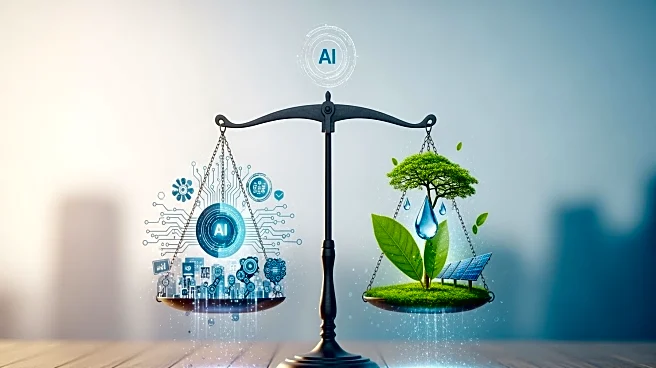What's Happening?
Artificial Intelligence (AI) is increasingly being integrated into Environmental, Social, and Governance (ESG) strategies, as highlighted in a recent series by edie. The series explores AI's dual role
as both a tool for sustainability and a potential disruptor of environmental goals. Despite its transformative potential, only 29% of organizations currently use AI for sustainability, though 51% plan to invest in AI technologies within the next 18 months. The series also reveals that while 76% of sustainability professionals believe AI could ease sustainability efforts, only 6% consider the industry ethical, and 92% call for stronger regulation. The discussions emphasize the need for transparency in AI's energy consumption and the importance of maintaining human oversight in AI applications.
Why It's Important?
The integration of AI into ESG practices is significant as it represents a shift towards more efficient and innovative approaches to sustainability. However, the ethical and environmental implications of AI use are critical concerns. The potential for AI to streamline emissions tracking and enhance sustainability reporting could lead to significant advancements in corporate responsibility and environmental protection. Yet, the lack of transparency in AI's energy use and the ethical concerns surrounding its deployment pose challenges. Companies that successfully navigate these issues stand to gain a competitive edge by aligning with growing demands for sustainable and ethical business practices.
What's Next?
As more organizations plan to invest in AI for sustainability, there is a pressing need for clearer regulations and standards to guide its ethical and environmentally responsible use. Businesses are encouraged to demand transparency from AI providers regarding energy consumption and to incorporate sustainability criteria into their procurement processes. This could lead to the development of a more responsible AI market, where sustainability and ethical considerations are prioritized. The ongoing dialogue among industry leaders, as facilitated by edie's series, is likely to influence future policies and practices in AI and ESG integration.
Beyond the Headlines
The broader implications of AI in ESG extend to the potential reshaping of corporate governance and operational efficiency. As AI technologies evolve, they could redefine how companies approach sustainability, potentially leading to new business models and strategies. The ethical considerations highlighted in the series underscore the need for a balanced approach that integrates human expertise with AI capabilities. This 'human in the loop' approach is crucial for ensuring accountability and context in AI applications, which could ultimately drive more sustainable and ethical outcomes.









